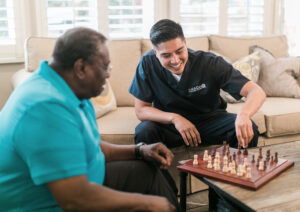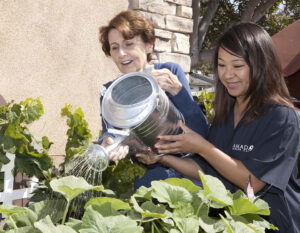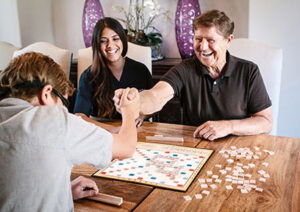A single mom at a time when it wasn’t all that common, working two jobs at a time to raise both daughters on her own, Rachael Moriarty*, 79, wasn’t about to ask her family for anything — under any circumstances. “It was a mindset she passed on to us,” says daughter Mia, “that fierce, can-do attitude no matter what.” Unfortunately, “no matter what” became an unmanageable situation for Rachael when she began to experience dizziness, her loss of balance causing her to fall several times. Still, she didn’t reveal these developments until a concussion and trip to the emergency room forced her hand. So how do you make sure your aging parent remains safe, healthy, and living as independently as possible?
Seniors Fear a Loss of Dignity
Like Rachael, many seniors are reluctant to admit any change in their physical or mental state to their family or even to themselves. Psychologists and others whose work involves treating an aging population say it is too much like admitting defeat, not wanting to risk losing their dignity and independence should others step in. Issues with overall health and well-being, alcohol, mobility, driving infractions or accidents, memory challenges, and money shortages are just a few of the secrets seniors are known to keep, sometimes not even identifying an issue as dangerous or problematic. In Rachael’s case, not wanting to burden the adult children she raised to be self-sufficient, now with families of their own, was the primary reason.
For others, dealing with big events such as retirement, or the decline or death of a spouse, may be stressful and overwhelming. These life changes can make a senior feel as though he or she is not in control, leading to feelings of anxiety and mistrust, even in confiding to family and friends. The added layer of a health issue can act as a catalyst to keep the secret, so that any vestiges of a life defined by familiarity and independence remain in place.
Building Trust with Your Senior Loved One
Making a senior loved one feel cornered by judging, preaching, accusing, or dictating can immediately close any lines of communication that may be open and available. If your loved one believes you are monitoring their every move, this can make them feel vulnerable and defensive. Though it is natural for adult children to be fearful of unreported changes, which can sometimes manifest as anger, being quietly hypervigilant is the right choice.
Expressing your observations in a kind, supportive way, and in that way forming a gentle alliance, will result in a higher level of trust and far better communication going forward. Your loved one needs to know it is safe to confide in you, and that you share the same values about independence, safety, and quality of life.
Opening the Door to a Conversation about Care
AgingCare recommends the following four tips to begin what can be an initially awkward conversation:
- Share an article or magazine story with them about the topic you wish to discuss.
- Be straightforward and simply ask permission to talk about the topic with them.
- Solicit support from siblings, their doctor, a religious leader, or another person your parent respects to facilitate the conversation.
- Ask them if they had any experiences helping their own parents or grandparents as they aged.
- Offer Your Senior Loved One Choices Whenever Possible
In their quest to maintain control over their own lives despite physical or cognitive limitations, seniors may still react strongly to opening up about anything amiss. Whenever possible and appropriate, offer an older adult a choice when interacting with him or her. This can be something as simple as asking whether the senior would like to have option A or B for lunch or seeing doctor A or B for an ailment. Having the ability to exercise choice can provide the senior a greater sense of confidence, self-esteem, and security, as he or she has more freedom and the power to be proactive.
Bear in mind your parents are not your children. You can only be as helpful as they will allow you to be. If there are no real cognitive issues, they are responsible for their own actions. That said, some secrets can reveal changes in judgment/mental capacity. If you believe a senior is not capable of making rational decisions, intervention is important. Your local Area Agency on Aging can help.
*Name has been changed for privacy purposes.
“Secrets Your Elderly Parents May Be Keeping,” written by Beth Herman, Amada blog contributor.















